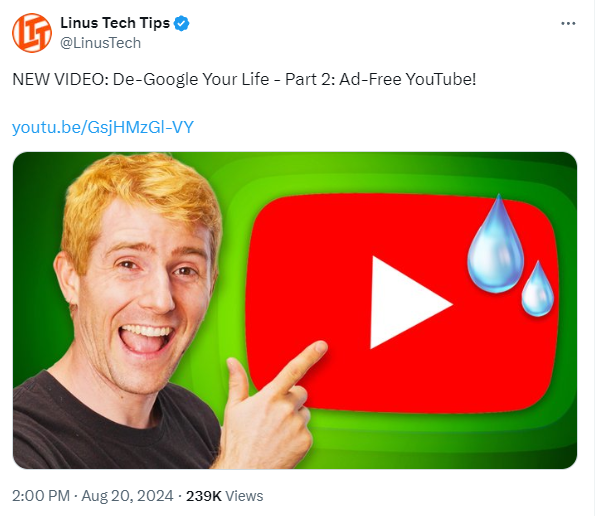https://files.catbox.moe/a6111d.png / https://nitter.poast.org/LinusTech/status/1825956050685800834

If you go the video, https://www.youtube.com/watch?v=GsjHMzGl-VY. You will see it’s gone. So Youtube being Youtube.
Here’s a Odysee mirror of the video, https://odysee.com/@jopec:7/linus-tech-tips-degoogle-your-life-part-2-adfree-youtube:0.


Where’s the lie? I provided the definition, and explained how what I said relates to it. If you disagree, point it out.
The part where your text wasn’t from a cited agreed upon source, but your own ass. God damn give it a rest and take your ADHD meds ffs.
You mentioned my definition, so I linked a commonly used dictionary definition. Here it is again in case you missed it:
https://www.merriam-webster.com/dictionary/piracy
I even copy/pasted the relevant part of the definition, ignoring the high seas definition. I don’t know what more you expect. If you have an issue with the source I cited, cite your own. If you have an issue with my interpretation of that definition, articulate it.
Are you daft? You chose one fourth of the definition, dismissing the parts that made you sound like a removed. Im sick and tired of having to engange with autistic pricks like yourself. Fucking take a hint.
Ok, here’s the rest:
Definitions 1 & 2 absolutely do not apply here, so I initially only copied the third, because it’s the only thing that could apply.
And here’s the legal definition (I usually don’t copy this because people tend to use the colloquial definition):
Again, 1 and 3 aren’t relevant. 2a also doesn’t apply because there’s no copying or distribution.
So we’re left with 2b. To decide whether it applies would require deciding whether TOS applies merely when accessing a website. I argue it doesn’t, and it would require some form of pop-up or something that the user would agree to before using the service to apply. This is typically done when creating an account, but I use YouTube without an acocunt, and YouTube never prompts me to agree to any form of TOS. So the layperson’s understanding here is that the content is fine to access over their app using the tools available in their app, and that any extensions in my browser should be fine since there’s no reason to suspect that they wouldn’t be (again, no TOS or measures on the website to prevent or discourage their use).
So the strongest argument is the legal definition 2b. There, that’s the type of rebuttal I was expecting you to make, and I went ahead and did that for you, as well as providing my own rebuttal to that argument. I could cite a bunch of prior art as well (e.g. DVRs, which were totally legal when they were common), but I’m guessing you’re not interested in having that discussion given your comments.
And no, I’m not autistic. I just prefer to have constructive discussions, and I’m not afraid of putting in some work to have them. It seems you are here for a different reason.
TL;DR - According to the common definition of piracy, blocking ads doesn’t apply. According to the legal definition, blocking ads could apply, but that depends on whether the TOS applies and is legally enforceable.